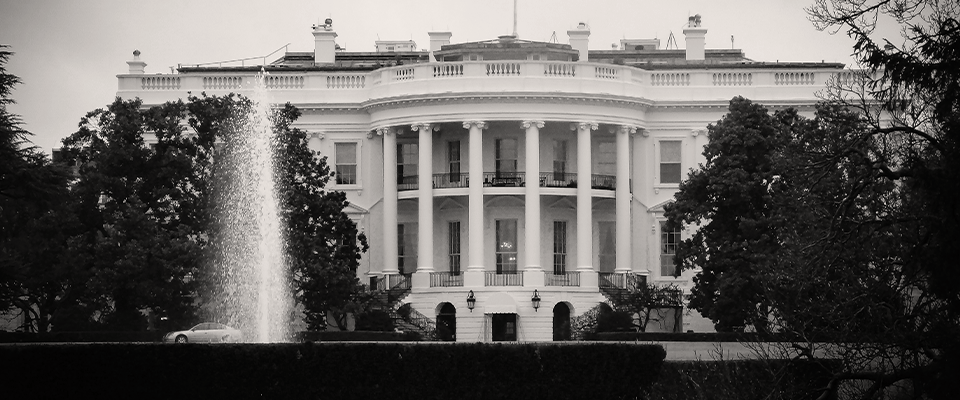The 2020 election is over and, with a significant lead in both the electoral and popular vote, Joe Biden has definitively beaten Donald Trump for the Presidency. That hasn’t stopped Trump, some Republican lawmakers, and many of the 70 million people who voted for him, from claiming that the election was rigged. Indeed, two weeks after Election Day, Trump has yet to concede. While both the Constitution and custom point to Biden taking the oath of office on January 20, unease over the presidential interregnum remains. Trump’s political brand, after all, is founded on unpredictability and impulsivity. No one knows what he’ll do in the next two months—or the damage that he might cause.
California queried UC Berkeley political science Professor Eric Schickler, an authority on U.S. legislative and presidential issues and the co-director of the university’s Institute of Governmental Studies, about what’s to come and what it means for our country.
Things have evolved rapidly since the election. When it became clear that Biden won, the resistance from the Trump administration led to muttering about a possible coup. That now seems far-fetched…Or does it?
Eric Schickler: I think the likelihood of something disrupting the transition in a fundamental way is very low right now. The most important point to make is that Biden won by relatively wide popular vote margins and the electoral slates in three critical states [Pennsylvania, Michigan, and Georgia], not one state [Florida] as we saw with Bush-Gore in 2000. There is no way the Republican Party can do the maneuvers necessary to reverse outcomes in three states. That’s the big picture, and every day we see more Republican leaders coming to grips with this, and distancing themselves from any notion of trying to reverse things.

Do you have any worries that Republican-led state legislatures might choose their own electoral slates, ignoring the popular votes in their states and ultimately handing Trump a victory?
ES: Again, those three states amount to a formidable—probably insurmountable—obstacle. First, it’s by no means clear if state legislatures have the legal authority to do this. Second, say a legislative leader in one of these states decides to try this, it will be difficult to keep all the members together, and there is a very real potential for a big hit from the voters. Any move like this would likely be extremely unpopular. And even if the effort succeeded, you’d still need two additional states to do the same thing to make a difference. And we certainly aren’t seeing much (or any) appetite from Republican legislators to go this route. So the reality is going to be that Biden will be inaugurated on January 20. That’s not to say that what we’re seeing now—[Trump’s] refusal to concede, the disinformation that’s disseminated, the obstacles being thrown up to prevent a smooth transition—aren’t problematic and damaging.
What about the courts? So far, Trump’s legal efforts to challenge the election haven’t amounted to anything. Is there any legitimate reason to expect that might change?
ES: For these kinds of suits to succeed, you need to make at least a minimal case for plausibility, that they could make a difference in the outcome of the election results. You’re going way out on a limb if a lawsuit doesn’t have a chance of making that difference. The likelihood of the Supreme Court stepping up in any way to help Trump at this point is very remote. First, the evidence has been nonexistent. Second, if any one case did succeed, it wouldn’t help him in all three states. And it would be costly to the court to even take up the cases. The justices would lose legitimacy without any benefit. We do have to recognize that the Supreme Court is not a unitary actor. I think [Chief Justice John] Roberts might be more concerned about the court’s legitimacy and legacy than [Clarence] Thomas, [Samuel] Alito and [Amy Coney] Barrett. But again, this is three states in 2020, not Florida alone in 2000. It’s not just 500 votes that are in question, as it was in Florida. It’s thousands of votes in each of the three states—more than 10,000 in the closest race [Georgia]. Justices and judges do care about political and policy outcomes. I have no doubt if the makeup in the court during the Florida case had been reversed in terms of the conservative and liberal ratio, the election would’ve gone to Gore. But for something like the Florida outcome to happen, all the stars have to be aligned. That alignment just isn’t there in 2020.
Given that neither route is liable to prove productive for Trump and he’ll ultimately have to leave office, are you concerned about any developments leading up to January 20?
ES: I’m concerned about two things. First, Trump has made the transition process complicated and difficult for Biden and Harris. It’s an enormous undertaking in the best of circumstances, with all the changes in staff at the various agencies, the hand-offs on programs and policies, the vetting of potential nominees. The fact that the General Services Administration hasn’t ascertained Biden as the President-Elect [which allows for the release of federal funds to support the transition] slows down the process enormously. If the GSA ascertains within the next week or so, the impact shouldn’t be that great. But if that doesn’t happen until December 14th [when state electors vote]—well, that is a very big deal. It makes the likelihood of a smooth transition unlikely, and that has some extremely serious implications, given the pandemic, the state of the economy, and security issues.
Also, since 1800 we’ve operated on the premise that elections are decisive and require the orderly transfer of power. We’ve had some elections that involved some dispute and required resolution, most notably the election of 1876. But for more than a hundred years, we haven’t had a situation where major government officials deny the legitimacy of a national election. That’s very worrisome, because the idea that our elections are valid and that orderly transitions are necessary sustains our core institutions and prevents civil unrest, including violence in the streets. I don’t anticipate any civil breakdown in the short term, but [Republican resistance] could set up a dangerous scenario four years from now. Say Biden is reelected by a narrow margin—it’s clear to neutral observers that he won, but it’s close—who knows what could happen then, given the ongoing erosion of faith in our core institutions. It’s the politics of illegitimacy.
You alluded to the election of 1876. What happened then?
ES: That election essentially closed the door to Reconstruction. Southern whites had used violence to stop southern Blacks from voting, and dueling sets of electors were presented in three southern states. The legitimacy of the election was questioned, and Congress formed a commission to determine a compromise. It ended with [Rutherford B.] Hayes, a Republican, assuming the presidency, but as part of the deal the federal government agreed to stop Reconstruction—which included the use of federal troops to guarantee voting rights. It consolidated Democratic rule in the South [Southern Democrats opposed the civil rights movement] and resulted in the broad—and violent—disenfranchisement of Black voters.
Do you see any parallels to 1876 in our current situation?
ES: Violence due to disputed electors was and is unlikely. The concern I had this year was an extremely close election. Given the rhetoric of ‘fraud’ and ‘rigged elections’ we’ve come to expect from this president, you couldn’t automatically assume that some state legislators or the courts wouldn’t step in to help him. That would be the nightmare scenario. An extremely close election—one that involved much narrower margins in key states than we’ve seen—might well have tempted some judges or state legislators to flip the outcome. Given how Republicans have reacted to Trump’s rhetoric in the aftermath of a clear Biden victory, you can’t say that kind of response is implausible.
You know, I’ve had some friends who look at this election and say it was a test, and the system worked. My response is that, yeah, it was a test—but not a really tough test. If it had been harder—like Florida in 2000, for example—the outcome could have been different.
Since the election, Trump has been purging the government of officials who displease him, replacing them with hardcore loyalists, and Attorney General William Barr has authorized his prosecutors to investigate possible election fraud—though in response, the head of DOJ’s election crime branch resigned and 16 federal prosecutors sent a letter to Barr denouncing his move. What are your thoughts on these developments?
ES: They’re deeply concerning. Trump’s moves don’t portend a coup, but they do reinforce a culture of vengeance and the prizing of personal loyalty above all else. For Biden, it will mean he has to move very quickly to either remove officials who are not qualified or trustworthy—or if that’s not possible, reassign them. It adds another layer to the complications of the transition.
Regarding Barr, it’s another sign of his willingness to use the DOJ as a political tool of the president. The pushback from the assistant U.S. attorneys is an important sign that [resistance] will continue for this extreme politicization. Barr will leave behind a demoralized DOJ, with a lot of uncertainty where the limits will be with respect to [the agency functioning] as a personal instrument of a President’s political goals.
Joe Biden was touted as the candidate who can heal America. Can he?
ES: My sense is that it will be a very steep challenge for Biden—certainly steeper than he expected prior to November 3. If you gave Biden truth serum before the election and you asked him, ‘Look, you win by this much and Trump won’t concede. What do you think [Senate Majority Leader Mitch McConnell] will do?’ I think his answer would be that McConnell would have been vocal in defending the election. So what’s happened is a bad sign. Biden had a theory of government—you take away the personalities that can incite people, like Trump or Obama, and then it’s possible to make arguments in good faith and reach agreements. I think what’s coming will put that idea to the test. Biden has to make deals, but it’s unclear if there’s any real incentive for McConnell to make deals. What McConnell cares about most is capturing more Senate seats for the Republicans in 2022 and electing a Republican President in 2024. And cutting deals with Biden won’t achieve that goal. Biden can do certain things through executive orders, but the big things, such as really addressing climate change and economic recovery, require legislative action.
So is it in the interests of McConnell and the Republican Party to turn everything into a smoking hulk during Biden’s administration?
ES: There may be policy areas where deals will help some vulnerable Republicans, so there could be incentive for McConnell to negotiate in some cases—but not many. The Democratic hope is that McConnell will say to himself, ‘We won on the courts, we have majority control in the Senate for some time, we gained in the House, and the country needs things. Republican states need local aid. So maybe we can work some things out.’ But his track record doesn’t make me optimistic. Things used to work that way in Washington, but they haven’t for the last 25 years or so—not since Newt Gingrich. McConnell took what Gingrich started [extreme party partisanship], and perfected it. Gingrich was a clumsy, poor manager. McConnell is a superb legislative strategist. Gingrich couldn’t keep the trains running. McConnell can and does.
Finally, Trump’s influence bodes to outlast his administration. Is he, as some opponents have claimed, an existential threat to the Republic?
ES: Some political scientists maintain Trump is not a serious threat simply because he’s been largely ineffective. In actual policy, he tended to behave as a conventional Republican. In the end, Congress controlled policy as much as or more than Trump. But what that argument misses is what an additional four years of Trump would do to our core institutions. Where would we be after eight years of a president who insists these institutions are inherently illegitimate, who reflexively claims elections are fraudulent, that constitutional norms are insignificant, who punishes his enemies through the power of the government? It’s not whether we end up as a democratic or authoritarian regime. I’m not worried about a military takeover. I’m worried that the institutions and norms that we’ve always counted on will no longer be there. So, in that sense, Trump is a serious threat to the American system, and even his defeat at the polls won’t eliminate that threat.
The big question is whether or not the United States will be a stable multiracial and multiethnic democracy. Trump’s defeat makes a stable democracy more likely. But a very big chunk of the polity clearly believes—like Trump—that one person/one vote doesn’t matter. Does anyone really think Trump wouldn’t have prevented five million people of color from voting if it had been in his power? Of course he would’ve. And how many Republican legislators and voters would’ve happily supported him? The more people he convinces that certain other people don’t have the right to vote and that our elections are innately fraudulent, the more damage he causes. I’m not saying we would’ve become an authoritarian country if he had won, but the degree of democracy in our system would’ve diminished. The long-term threat would’ve increased.


















